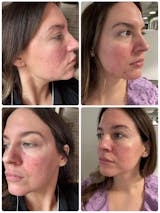
Has anyone ever said you look like your mom or dad?
Back in school, we learned that much of who we are is shaped by our parents through a little something called genetics.
Our eyes, nose, and even some of our personality comes down to our genes.
If you’ve ever wondered if you inherited acne from your parents and what you can do about it, read on!
The Link Between Acne and Genetics
The short answer is yes, acne does have a genetic component.
But the connection isn’t a clear, straight line.
You see, there are four key processes that lead to the formation of acne1:
- Increased shedding of skin cells that cause clogged pores
- Increased sebum production
- Colonization of the follicles by the Propionibacterium acnes bacteria
- Complex inflammatory mechanisms
While there isn’t one specific gene that causes acne, research has shown that your genes can influence your chances of having acne. This could be because our genes can control the above processes in our bodies and in turn, make our skin ideal homes for spots.
Let’s Check Out Some Studies
#1 A 2020 systematic review observed a strong association between family history and acne2. This means that if your parents have acne, you’re more likely to have it too.
#2 Looking at the DNA of 26,722 people, scientists found genetic variations in 15 genome regions that were more common in people with severe acne. Many of the genetic variants discovered influence hair follicle formation, which means this could be a big risk factor for developing acne3.
#3 In a study on family history, researchers found having a first-degree relative (parents, children, and siblings) with acne increases your risk of getting it by 4 times. This is because genes may determine the failure of follicles to become acne‐resistant in early adult life4.
#4 A study of Iranian adolescents found that the prevalence of moderate to severe acne was 19.9% in pupils with a family history of acne, as opposed to only 9.8% in those without a family history. The risk of acne severity also increased with the number of family members with acne history5.
#5 A large twin study of women found that family history of acne was significantly associated with an increased risk. Genes explained 81% of the difference in acne prevalence and only 19% was attributed to unshared environmental factors – such as stress6.
#6 Another study found that family history of acne is associated with acne occurring earlier, having more blackheads and whiteheads, and more frequent relapse after isotretinoin7.
#7 Lastly, a study on the influence of genes on sebum production found that identical twins had virtually the same rates of sebum excretion while non-identical twins had different rates. But, both identical and non-identical twins had different degrees of acne severity. This suggests that while sebum production is under genetic control, our environment too has a role to play in whether we get acne8.

You Can’t Change Your Genes. But Here’s What You Can Control.
Before we start pointing fingers at our beloved family, let’s take a moment to emphasize that having ‘acne genes’ doesn’t mean you’ll get it for sure! While your genes can make it more likely for you to get acne, your environment and everyday habits are important too.
For example, acne can be affected negatively by irregular menstrual cycles, sugary food, dairy products, the improper use of cosmetics, the poor quality of sleep, stress, and more9.
You can care for your skin by taking care of yourself. Here’s a little checklist to help you get acne under control, no matter your genes:
- Eat a balanced diet with plenty of fruits and vegetables.
- Get 7-9 hours of sleep a night.
- Manage your stress with yoga, meditation, or your favorite way to unwind.
- Wash your face twice a day with a cleanser suited to your skin type.
- Make sure anything that touches your skin, from your fingers to your phone, are clean.
- Choose quality, non-comedogenic products. These are products that won’t clog pores – like Clearly Basics!
References
- A.U. Tan et al., 2018: A review of diagnosis and treatment of acne in adult female patients
- Anna Hwee Sing Heng et al., 2020: Systematic review of the epidemiology of acne vulgaris
- Christos Petridis et al., 2018: Genome-wide meta-analysis implicates mediators of hair follicle development and morphogenesis in risk for severe acne
- Goulden et al., 2001: The familial risk of adult acne: a comparison between first‐degree relatives of affected and unaffected individuals
- S. Zahra Ghodsi et al., 2009: Prevalence, Severity, and Severity Risk Factors of Acne in High School Pupils: A Community-Based Study
- V Bataille et al., 2002: The influence of genetics and environmental factors in the pathogenesis of acne: a twin study of acne in women
- F Ballanger et al., 2006: Heredity: a prognostic factor for acne
- S Walton et al., 1988: Genetic control of sebum excretion and acne–a twin study
- Jianting Yang et al., 2020: A Review of Advancement on Influencing Factors of Acne: An Emphasis on Environment Characteristics
Disclaimer: This article should not be interpreted as personal medical advice. For medical-related matters, please consult your dermatologist.







